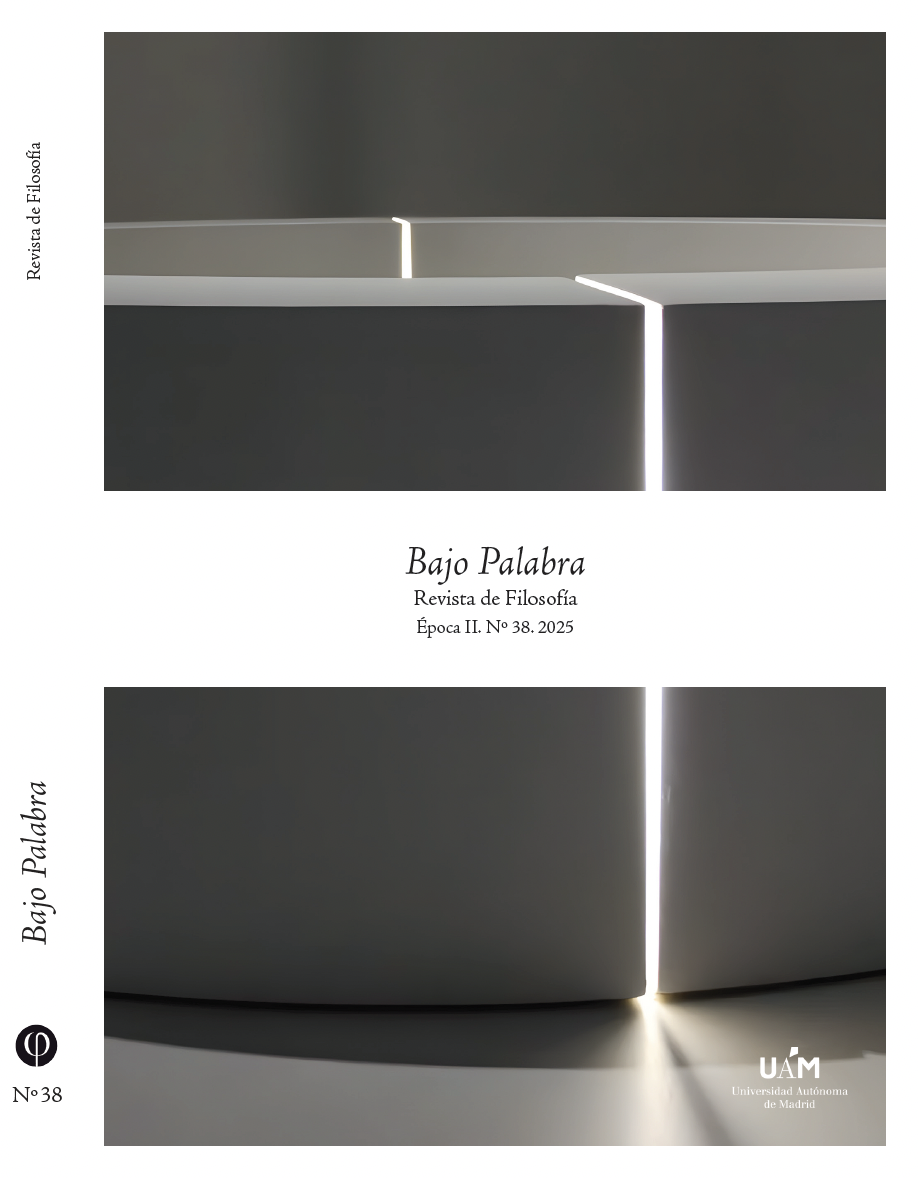Keywords:
Mimetic contagion, biological naturalism, fiction, empathyCopyright (c) 2025 Elena Yrigoyen

This work is licensed under a Creative Commons Attribution 4.0 International License.
Abstract
Mimetic contagion continues to instill fear in contemporary democratic societies, resulting in a rejection of mimesis as a producer of social bonds. However, from the perspective of biological naturalism, mimesis is recognized as an evolutionary phenome-non intrinsic to our species and many others, facilitating a more nuanced understanding of its relationship with affect. This paper advocates for the necessity of training our mimetic skills to paradoxically enhance our ability to resist the effects of mimetic contagion and to expand the horizons of typical social bonds.
Downloads
References
Byrne, R. and Russon, A., “Learning by Imitation: A Hierarchical Approach”, The Behavioral and Brain Sciences, 21, n.o 5, 1998. https://doi.org/10.1017/ s0140525x98001745.
Canetti, Elias, Crowds and Power, New York, Farrar, Straus and Giroux, 1984.
Chartrand, Tanya L., and van Baaren, Rick, “Human mimicry”, Advances in experimental social psychology, Vol 41, pp. 219-74. San Diego, CA, US: Elsevier Academic Press, 2009. https://doi.org/10.1016/S0065-2601(08)00405-X.
Chartrand, Tanya L., y Amy N. Dalton, “Mimicry: Its ubiquity, importance, and functionality”, Oxford handbook of human action, New York, NY, US, Oxford University Press, 2009, pp. 458-83.
Chater, Nick & Hurley, Susan (eds.), Perspectives on Imitation, Volume 1: From Neuroscience to Social Science. Mechanisms of Imitation and Imitation in Animals, The MIT Press, 2005. https://doi.org/10.7551/mitpress/5330.001.0001.
Chico, David Perez, «¿Problema, qué problema? Naturalismo biológico y el problema Mente-Cuerpo», Teorema: International Journal of Philosophy 18, n.o 1, 1999, pp. 125-38.
Corcoran, K., “The Trouble With Searle’s Biological Naturalism”, Erkenntnis 55, 2001, pp. 307-24. https://doi.org/10.1023/A:1013386105239.
Domínguez, Asier Arias, «El embrollo causal del naturalismo biológico», Daimon. Revista Internacional de Filosofia, n.o 92, 2024, pp. 131-43. https://doi.
org/10.6018/daimon.458871.
Gadamer, Hans-Georg, Truth and Method, London, Bloomsbury Academic, 2013. Gebauer, Gunter, y Christoph Wulf, Mimesis: Culture Art Society, Berkeley, University of California Press, 1996.
Gibbs, Anna, “Panic! Affect Contagion, Mimesis and Suggestion in the Social Field”, Cultural Studies Review 14, n.o 2, 1970. https://doi.org/10.5130/csr.v14i2.2076.
Girard, René, To Double Business Bound, Johns Hopkins University Press, 1988. https://doi.org/10.56021/9780801821141.
Hatfield, Elaine, John T. Cacioppo, y Richard L. Rapson, “Emotional contagion”, Current Directions in Psychological Science, vol. 2, n.o 3, 1993, pp. 96-99. https://doi.org/10.1111/1467-8721.ep10770953.
Levy, Neil, “Paul E. Griffiths (1996), ‘The Historical Turn in the Study of Adaptation’”, British Journal for the Philosophy of Science, vol. 47, Routledge, 2010, pp. 511-32.
Nussbaum, Martha Craven, Poetic Justice: The Literary Imagination and Public Life, USA, Beacon Press, 1995.
Preston, Francesco and de Waal, Frans, “Empathy: Its Ultimate and Proximate Bases”, The Behavioral and Brain Sciences, n.º 25, 1, 2002. https://doi. org/10.1017/s0140525x02000018.
Ricoeur, Paul, Time and Narrative, Volume 1, Chicago, IL, University of Chicago Press, 1990.
Searle, John, “Biological Naturalism”, The Blackwell Companion to Consciousness, John Wiley & Sons, Ltd, 2017, pp. 327-36. https://doi. org/10.1002/9781119132363.ch23.
Searle, John R., Intentionality: An Essay in the Philosophy of Mind, Cambridge, Cambridge University Press, 1983. https://doi.org/10.1017/ CBO9781139173452.
Schaeffer, J.-M., El fin de la excepción humana, Barcelona, Marbot Editores, 2009.
Schaeffer, J.-M., Why Fiction? Nebraska, University of Nebraska Press, 2010.
Tarde, Gabriel, Les lois de l’imitation: Étude sociologique, France, Adamant, 2003.
Taussig, Michael, Mimesis and Alterity: A Particular History of the Senses, New York, Routledge, 1993.
Tomasello, Michael, The Cultural Origins of Human Cognition, Harvard, Harvard University Press, 2009.
Waal, Frans B. M. de, “Putting the Altruism Back into Altruism: The Evolution of Empathy”, Annual Review of Psychology, 59, 2008, pp. 279-300. https://doi. org/10.1146/annurev.psych.59.103006.093625.
Waal, Frans B. M. de, and Pier Francesco Ferrari, “Towards a Bottom-up Perspective on Animal and Human Cognition”, Trends in Cognitive Sciences 14, 5, 2010, pp. 201-7. https://doi.org/10.1016/j.tics.2010.03.003.

